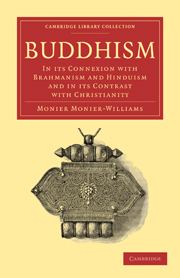Book contents
- Frontmatter
- Preface
- Postscript on the common error in regard to the comparative prevalence of Buddhism in the world
- Contents
- List of Illustrations
- Rules for Pronunciation
- Pronunciation of Buddha, etc. Addenda and Corrigenda
- LECTURE I INTRODUCTORY OBSERVATIONS
- LECTURE II THE BUDDHA AS A PERSONAL TEACHER
- LECTURE III THE DHARMA OR LAW AND SCRIPTURES OF BUDDHISM
- LECTURE IV THE SAṄGHA OR BUDDHIST ORDER OF MONKS
- LECTURE V THE PHILOSOPHICAL DOCTRINES OF BUDDHISM
- LECTURE VI THE MORALITY OF BUDDHISM AND ITS CHIEF AIM—ARHATSHIP OR NIRVĀṆA
- LECTURE VII CHANGES IN BUDDHISM AND ITS DISAPPEARANCE FROM INDIA
- LECTURE VIII RISE OF THEISTIC AND POLYTHEISTIC BUDDHISM
- LECTURE IX THEISTIC AND POLYTHEISTIC BUDDHISM
- LECTURE X MYSTRICAL BUDDHISM IN ITS CONNEXION WITH THE YOGA PHILOSOPHY
- LECTURE XI HIERARCHICAL BUDDHISM, ESPECIALLY AS DEVELOPED IN TIRET AND MONGOLIA
- LECTURE XII CEREMONIAL AND RITUALISTIC BUDDHISM
- LECTURE XIII FESTIVALS, DOMESTIC RITES, AND FORMULARIES OF PRAYERS
- LECTURE XIV SACRED PLACES
- LECTURE XV MONASTERIES AND TEMPLES
- LECTURE XVI IMAGES AND IDOLS
- LECTURE XVII SACRED OBJECTS
- SUPPLEMENTARY REMARKS ON THE CONNEXION OF BUDDHISM WITH JAINISM
- LECTURE XVIII BUDDHISM CONTRASTED WITH CHRISTIANITY
- OBSERVE
- Plate section
LECTURE III - THE DHARMA OR LAW AND SCRIPTURES OF BUDDHISM
Published online by Cambridge University Press: 29 August 2010
- Frontmatter
- Preface
- Postscript on the common error in regard to the comparative prevalence of Buddhism in the world
- Contents
- List of Illustrations
- Rules for Pronunciation
- Pronunciation of Buddha, etc. Addenda and Corrigenda
- LECTURE I INTRODUCTORY OBSERVATIONS
- LECTURE II THE BUDDHA AS A PERSONAL TEACHER
- LECTURE III THE DHARMA OR LAW AND SCRIPTURES OF BUDDHISM
- LECTURE IV THE SAṄGHA OR BUDDHIST ORDER OF MONKS
- LECTURE V THE PHILOSOPHICAL DOCTRINES OF BUDDHISM
- LECTURE VI THE MORALITY OF BUDDHISM AND ITS CHIEF AIM—ARHATSHIP OR NIRVĀṆA
- LECTURE VII CHANGES IN BUDDHISM AND ITS DISAPPEARANCE FROM INDIA
- LECTURE VIII RISE OF THEISTIC AND POLYTHEISTIC BUDDHISM
- LECTURE IX THEISTIC AND POLYTHEISTIC BUDDHISM
- LECTURE X MYSTRICAL BUDDHISM IN ITS CONNEXION WITH THE YOGA PHILOSOPHY
- LECTURE XI HIERARCHICAL BUDDHISM, ESPECIALLY AS DEVELOPED IN TIRET AND MONGOLIA
- LECTURE XII CEREMONIAL AND RITUALISTIC BUDDHISM
- LECTURE XIII FESTIVALS, DOMESTIC RITES, AND FORMULARIES OF PRAYERS
- LECTURE XIV SACRED PLACES
- LECTURE XV MONASTERIES AND TEMPLES
- LECTURE XVI IMAGES AND IDOLS
- LECTURE XVII SACRED OBJECTS
- SUPPLEMENTARY REMARKS ON THE CONNEXION OF BUDDHISM WITH JAINISM
- LECTURE XVIII BUDDHISM CONTRASTED WITH CHRISTIANITY
- OBSERVE
- Plate section
Summary
Probably most educated persons are aware that Buddhists have their own sacred scriptures, like Hindūs, Pārsīs, Confucianists, Muhammadans, Jews, and Christians. It is not, however, so generally known that in one important particular these Buddhist scriptures, constituting the Tri-piṭaka (p. 61), differ wholly from other sacred books. They lay no claim to supernatural inspiration. Whatever doctrine is found in them was believed to be purely human—that is, was held to be the product of man's own natural faculties working naturally.
The Tri-piṭaka was never like the Veda of the Brāhmans, believed to be the very ‘breath of God’; the same care, therefore, was not taken to preserve every sound; and when at last it was written down the result was a more scholastic production than the Veda.
Moreover, it was not composed in the Sanskṛit of the Veda and Ṡāstras—in the sacred language, the very grammar and alphabet of which were supposed to come from heaven—but in the vernacular of the part of India in which Buddhism flourished. Indeed, it is a significant fact that while the great sages of Sanskṛit literature and philosophy, such as Vyāsa, Kurmārila, and Ṡaṅkara, in all probability spoke and taught in Sanskṛit, the Founder of Buddhism preferred to communicate his precepts to the people in their own vernacular, afterwards called Pāli.
- Type
- Chapter
- Information
- BuddhismIn its Connexion with Brahmanism and Hinduism and in its Contrast with Christianity, pp. 53 - 70Publisher: Cambridge University PressPrint publication year: 2010First published in: 1889



